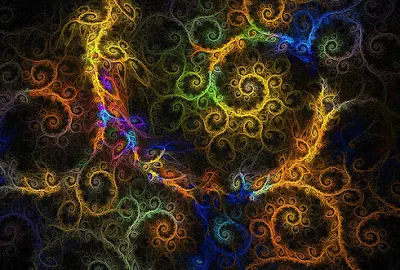Theists who believe in an infinitely omniscient (i.e. all knowing, with special emphasis on the 'all') deity believe in a god which must hold a conceptual model of the entire universe, and, if there are other universes, of all of those as well. This model will need to be constantly and instantly updated even to the exact position of every elementary particle and every vibration of every super-string.
Have you ever done that thing with a mirror where you hold it up to another mirror and see a tunnel of diminishing mirrors disappearing into the distance, usually round a bend, unless you're holding the mirror exactly parallel to the other one? This looks like an infinity of mirrors, but there is a lower limit to the size of the image of the mirror you are holding which can be reflected back to you, even if your eyesight is perfect. This is directly related to the wavelength of light. Below that distance, using visible light two objects will appear as one.
Near Beaconsfield, just a short ride west down the M40 from London, UK, is a model village of Bekonscot, reputedly the world's oldest, and as accurate as its creator could make it in 1929. It includes a model of the model village in which there is a model of the model village... and so on, until it becomes a shapeless blob, because, with the best of intentions no one could create accurate buildings, streets, roadside furniture, etc to sufficient detail to be seen by human eyes.
In the theists' god's conceptual model will be a model of itself complete with it conceptual model which will also need to be constantly updated in real time, as will the conceptual model of itself within that conceptual model of itself, and every other infinitely diminishing model within it.
Except of course, because it knows all things, our god can't allow itself the luxury of diminishing models. It can't reduce its conceptual model to a mere blob or stop at the lower limits of resolution because, being also omniscient, it has no such lower limits, otherwise it will not be all knowing; there would be a limit to its knowledge.
It is a bit like fractals, only where fractals repeat at a lower level of magnification, an omniscient god's conceptual models will all have to be full-sized.
So, to be omniscient, the theists' god must have an infinite number of conceptual models of the Universe, including itself, all of which are accurate in absolute detail and all of which are being simultaneously and instantly updated. The transfer of information can't be limited by the velocity of light but must be instantaneous, otherwise there would be a period during which the god doesn't know something.
In fact, because this supposed god is omniscient, its conceptual model will be indistinguishable from the real thing, as will all the infinity of full-sized models within that conceptual model. And of course the god itself must monitor this infinitely complex conceptual model to keep itself omniscience, as must all the infinite number of gods.
Because they are indistinguishable from the real thing, they will no longer be models. They will be real things, just as a full-sized, accurate in every detail, 'model' of a steam engine, doll's house or village would be a real steam engine, doll's house or village.
So, if the theists' god is omniscient, there must be an infinite number of them in an infinite number of identical universes, each of which contains an infinite number of identical gods in identical full-sized universes... and so ad infinitum.
So, theists, and especially creationists, would you like to explain how a single god can be omniscient and how this infinite complexity (the ultimate Boeing 747) arose without an intelligent designer and with nothing from which to construct it?
Ten Reasons To Lose Faith: And Why You Are Better Off Without It
This book explains why faith is a fallacy and serves no useful purpose other than providing an excuse for pretending to know things that are unknown. It also explains how losing faith liberates former sufferers from fear, delusion and the control of others, freeing them to see the world in a different light, to recognise the injustices that religions cause and to accept people for who they are, not which group they happened to be born in. A society based on atheist, Humanist principles would be a less divided, more inclusive, more peaceful society and one more appreciative of the one opportunity that life gives us to enjoy and wonder at the world we live in.
Available in Hardcover, Paperback or ebook for Kindle





No comments:
Post a Comment
Obscene, threatening or obnoxious messages, preaching, abuse and spam will be removed, as will anything by known Internet trolls and stalkers, by known sock-puppet accounts and anything not connected with the post,
A claim made without evidence can be dismissed without evidence. Remember: your opinion is not an established fact unless corroborated.